Fighting City Hall: The People's Medicine in Action (cont'd.)
 But the city had no intention of expediting a process they viewed with some hostility. When presented with the election results
and a request to begin negotiating, the City Manager refused to bargain until the election was duly certified by the Massachusetts
Labor Relations Commission (MLRC). Since that process could last many months, this response was viewed as a delaying tactic.
But the city had no intention of expediting a process they viewed with some hostility. When presented with the election results
and a request to begin negotiating, the City Manager refused to bargain until the election was duly certified by the Massachusetts
Labor Relations Commission (MLRC). Since that process could last many months, this response was viewed as a delaying tactic.
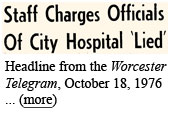 As noted above, the Physicians National Housestaff Association delegates had also voted to become a trade union.
Closer to
home, the house staff of Cambridge Hospital were engaged in a similar dispute with their hospital and had brought their case before the
Massachusetts Labor Relations Board for a decision on whether house staff should be considered students or employees.
Using the same legal team as their Cambridge Hospital colleagues, the WCHPHA appealed to the Massachusetts Labor Relations Commission,
too. In May of 1976, the MLRB ruled in favor of the Cambridge Hospital residents, a development promptly noted by the Worcester
contingent. And by December, 1976, the same commission ruled in their favor as well, noting that although interns and residents at City
Hospital receive medical training, and thus are students in part, they also fulfill a significant employee function and, "therefore had
the right to organize for collective bargaining."(99) Yet the city still refused to negotiate, no doubt
reasoning that the house officers, by definition, would not be around for more than another year or two before moving on to permanent
jobs elsewhere.
As noted above, the Physicians National Housestaff Association delegates had also voted to become a trade union.
Closer to
home, the house staff of Cambridge Hospital were engaged in a similar dispute with their hospital and had brought their case before the
Massachusetts Labor Relations Board for a decision on whether house staff should be considered students or employees.
Using the same legal team as their Cambridge Hospital colleagues, the WCHPHA appealed to the Massachusetts Labor Relations Commission,
too. In May of 1976, the MLRB ruled in favor of the Cambridge Hospital residents, a development promptly noted by the Worcester
contingent. And by December, 1976, the same commission ruled in their favor as well, noting that although interns and residents at City
Hospital receive medical training, and thus are students in part, they also fulfill a significant employee function and, "therefore had
the right to organize for collective bargaining."(99) Yet the city still refused to negotiate, no doubt
reasoning that the house officers, by definition, would not be around for more than another year or two before moving on to permanent
jobs elsewhere.
Predicting the city's intransigence, the WCHPHA began to plan for a strike and had given the City until October 1, 1976 to begin collective bargaining. Throughout, the newspapers reported their actions and community groups began to mobilize, undoubtedly with some encouragement from Gene Petit and residents, like Dan Doyle, who not only worked at the hospital but also lived nearby. Doyle was interviewed by a reporter from the College of the Holy Cross student newspaper: "Doyle charges that the other three hospitals [St. Vincent's, Hahnemann, and Memorial] face increasing competition for patients from the new University of Massachusetts medical facility [which had just opened] and would like to get paying patients away from City Hospital. The vacancy rate for hospital beds in Worcester is currently between 35-40 percent. 'We think,' said Doyle, 'that there are strong economic forces at work to have City Hospital die. We're fighting not just for ourselves but for survival of community health service.'"(100)
The city administration began to fight back. According to letters from the law firm now representing the house staff, some
residents and interns—chiefly those who were foreign medical graduates—were being harassed with the threat of losing their
 visas. The house staff association circulated a letter to their members, alerting them to the possibility of their being "warned against
participation" in the PHA activities. Attorney Jonathan Hiatt wrote to remind one of the senior physicians that, "activities of this
nature would, of course, result in swift legal action on the Association's part."(101) The residents' homegrown
newspaper, the Blunt Probe, written and produced mainly by Gene Petit, ran headlines such as, "Moschos Won't Negotiate as
Deadline Nears."
visas. The house staff association circulated a letter to their members, alerting them to the possibility of their being "warned against
participation" in the PHA activities. Attorney Jonathan Hiatt wrote to remind one of the senior physicians that, "activities of this
nature would, of course, result in swift legal action on the Association's part."(101) The residents' homegrown
newspaper, the Blunt Probe, written and produced mainly by Gene Petit, ran headlines such as, "Moschos Won't Negotiate as
Deadline Nears."
More effective than threats or procrastination, however, was the residents' own reluctance to walk out on their patients. The
city manager's office assured the residents that they would come to the bargaining table once their appeal of the state's Labor
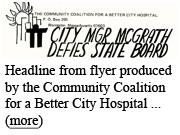 Relations Commission decision was settled. Thus, on October 7, 1976, one day after the PHA leadership presented a strike proposal
for consideration by the members, a majority decided not to go out on strike after all. Co-presidents Diana DeCosimo and Dan Doyle
reported that, "Last night our association voted not to go on strike at this time, however it was the strong sentiment that if the
City of Worcester refuses to abide by a decision of the Mass. State Labor Relations Commission in our favor and enters into a
lengthy process of litigation a strike may be necessary."(102)
Relations Commission decision was settled. Thus, on October 7, 1976, one day after the PHA leadership presented a strike proposal
for consideration by the members, a majority decided not to go out on strike after all. Co-presidents Diana DeCosimo and Dan Doyle
reported that, "Last night our association voted not to go on strike at this time, however it was the strong sentiment that if the
City of Worcester refuses to abide by a decision of the Mass. State Labor Relations Commission in our favor and enters into a
lengthy process of litigation a strike may be necessary."(102)
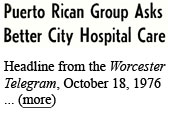 But, when the LRC reaffirmed its original decision in favor of the residents, City Hall did not begin to negotiate. The Coalition
for a Better City Hospital spoke before the Worcester City Finance Committee in January, 1977 calling for the City to save its
hospital, but to no avail. Demonstrations of concern by neighborhood residents made no difference to the City Manager's office.
Instead, the administration began letting it be known that they might even consider closing the hospital or selling it to the
But, when the LRC reaffirmed its original decision in favor of the residents, City Hall did not begin to negotiate. The Coalition
for a Better City Hospital spoke before the Worcester City Finance Committee in January, 1977 calling for the City to save its
hospital, but to no avail. Demonstrations of concern by neighborhood residents made no difference to the City Manager's office.
Instead, the administration began letting it be known that they might even consider closing the hospital or selling it to the
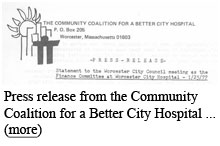 medical school to be used for some other purpose. Members of the City Council, neighborhood residents, and the house staff
themselves, all expressed astonishment at the decay of a hospital once considered a point of pride for the city. But, rather than
spend millions to correct profound deficiencies, the city believed it was justified in looking for a more prudent fiscal
alternative. In fact, they had begun to consider the hospital redundant, given the new presence of University Hospital and the
continuing viability of Memorial and St. Vincent's closer to downtown. Even after it was demonstrated that eighty percent of
patients at City were not indigent, but in fact possessed third party insurance that the hospital was neglecting to recover, the
McGrath administration seems to have viewed saving this municipal hospital as either hopeless or pointless.
medical school to be used for some other purpose. Members of the City Council, neighborhood residents, and the house staff
themselves, all expressed astonishment at the decay of a hospital once considered a point of pride for the city. But, rather than
spend millions to correct profound deficiencies, the city believed it was justified in looking for a more prudent fiscal
alternative. In fact, they had begun to consider the hospital redundant, given the new presence of University Hospital and the
continuing viability of Memorial and St. Vincent's closer to downtown. Even after it was demonstrated that eighty percent of
patients at City were not indigent, but in fact possessed third party insurance that the hospital was neglecting to recover, the
McGrath administration seems to have viewed saving this municipal hospital as either hopeless or pointless.
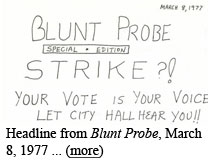 The Blunt Probe called for action: "Strike?! Your [strike] Vote is your Voice," and once again the residents' association gave
the city ten days' notice of an impending "job action," this time in defense of both the residents' right to collective bargaining and
of City Hospital's very existence.(103) By this time, even members of the City Council
had voiced support for the
residents' right to a fair hearing and vocally expressed dismay over
the hospital's sad condition. But the Council was divided over
the ultimate fate of the hospital. At one council meeting in February, 1977, several councilors, while regretting its condition,
The Blunt Probe called for action: "Strike?! Your [strike] Vote is your Voice," and once again the residents' association gave
the city ten days' notice of an impending "job action," this time in defense of both the residents' right to collective bargaining and
of City Hospital's very existence.(103) By this time, even members of the City Council
had voiced support for the
residents' right to a fair hearing and vocally expressed dismay over
the hospital's sad condition. But the Council was divided over
the ultimate fate of the hospital. At one council meeting in February, 1977, several councilors, while regretting its condition,
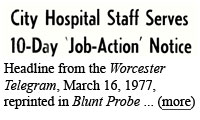 acknowledged that, "'the specifics of City Hospital's future are not as clear as they should be … studies might forecast a
shift in emphasis at City Hospital from hospitalized care to walk-in medical treatment … and I think that will include new
medical facilities for the hospital.'" The Blunt Probe felt it necessary to remind its readers, "Our fight for decent working
conditions and better patient care and a contract doesn't stop just because City Hospital's future is unclear. We support community
input into decisions affecting WCH & we still have the right to a contract wherever we work. City Hospital isn't dead and neither is
W.C.H.P.H.A.!"(104)
acknowledged that, "'the specifics of City Hospital's future are not as clear as they should be … studies might forecast a
shift in emphasis at City Hospital from hospitalized care to walk-in medical treatment … and I think that will include new
medical facilities for the hospital.'" The Blunt Probe felt it necessary to remind its readers, "Our fight for decent working
conditions and better patient care and a contract doesn't stop just because City Hospital's future is unclear. We support community
input into decisions affecting WCH & we still have the right to a contract wherever we work. City Hospital isn't dead and neither is
W.C.H.P.H.A.!"(104)
